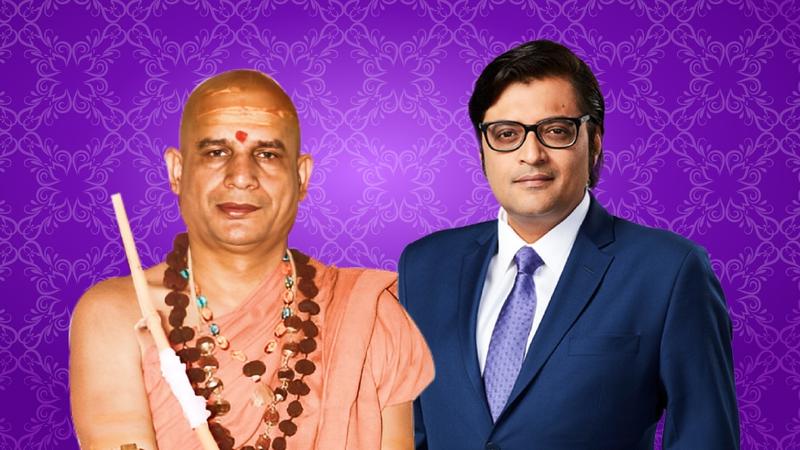Published 18:46 IST, August 19th 2024
Swami Sadanand Saraswati Raises Alarm on Hindus' Plight in Bangladesh, Urges Diplomatic Action
Jagadguru Shankaracharya Swami Sadanand Saraswati Ji, the head of Dwarka Sharada Peeth, has expressed grave concerns about the plight of Hindus in Bangladesh.

New Delhi: Jagadguru Shankaracharya Swami Sadanand Saraswati Ji, the head of the Dwarka Sharada Peeth, has expressed grave concerns about the plight of Hindus in Bangladesh. Speaking to Republic Media Network's Editor-in-Chief Arnab Goswami, Swami Sadanand Saraswati Ji has emphasised the urgent need for diplomatic efforts, and urged, “The governments of India and Bangladesh should sit down and discuss the situation of Hindus.”
Highlighting regional issues, he noted, "The situation of Hindus in Pakistan and Bangladesh is not good," pointing to the challenges faced by Hindu communities in both countries. Swami Sadanand Saraswati Ji also remarked, "What has been happening for the past 50 years is not right," underscoring the prolonged difficulties encountered by Hindus in the region.
Swami Sadanand Saraswati stated that, like in Afghanistan and Iran, radical elements in Bangladesh now want to impose their will. He questioned why Hindus living there are being targeted if there are disputes with the government, asking, "What is their fault? Why are they being selectively killed? Why are their temples being destroyed?" He emphasized that the situation of Hindus in Bangladesh is being closely observed and suggested that it would be best for the governments of India and Bangladesh to sit down and discuss the issue to find a solution.
In light of recent unrest in Bangladesh, he expressed concerns that the situation could evolve towards the implementation of Sharia Law, similar to that in Afghanistan under the Taliban or in Iran. He questioned, "What is the mistake of them, why are they being targeted?" His statements reflect growing international concern over the treatment of minority communities in South Asia and highlight the need for continued dialogue and intervention.
Shankaracharya Swami Sadanand Saraswati said, "The opinions of the Shankaracharyas of all four Peeths are the same, and our principles are the same. All the Acharyas and Mahamandaleshwars of our country are concerned about this issue. A solution to this problem should be found soon. If not, it will become a norm that wherever Hindus live around the world, when problems arise, there will be no one to help them. Therefore, we want to send a message to Hindus across the country and the world that they should do whatever they can to protect and uphold Sanatan Dharma wherever they are."
He also stated, "There are hardly any followers of Sanatan Dharma in Pakistan. In Bangladesh, there are still about 1.25 crore. Even with such a large number, when they are facing crises, it should be considered, and Muslims in India should also reflect on who is doing the killing there. Your conflict is with the government. Muslims are persecuting Muslims, Muslims are persecuting Hindus, and Sikhs are being persecuted. All minorities are facing oppression, so we need to be alert as well."
Bangladesh violence stirred fear within the country's Hindu minority
Following the recent unrest in Bangladesh, the country’s former Prime Minister Sheikh Hasina fled to India on August 5 after weeks of violent protests that prompted her ouster. She is likely to stay in New Delhi until she decides where she will seek asylum. An interim government led by Nobel laureate Muhammad Yunus has assumed power in Bangladesh and is expected to organize fresh elections.
During the protests in Bangladesh, many Hindu homes, shops and businesses were attacked. Yunus met with Hindu community leaders earlier this week and assured them of their protection.
The student-led protests began in July against a quota system for government jobs that critics said benefitted people with connections to Hasina’s party. The protests morphed into a movement against her government, leaving more than 300 people dead including students and police officers in the ensuing violence.
Members of the country's Hindu minority feel the most vulnerable because they have traditionally backed the Awami League — seen as a secular party in the Muslim-majority nation — and because of a history of violence against them during previous upheavals.
In the week since Hasina was ousted, there have been at least 200 attacks against Hindus and other religious minorities across 52 districts, according to the Bangladesh Hindu Buddhist Christian Unity Council, a minority rights group that has been tracking incidents.
The interim government put in place after Hasina’s ouster has condemned the attacks as “heinous” and said it was working with community leaders to ensure Hindus' safety.
Hindus, who make up 8% of the population and are the largest minority group, “are shivering,” said Kajal Debnath, a vice president of the Bangladesh Hindu Buddhist Christian Unity Council. “They are closing their doors, they are not opening it without confirming who is knocking. Everybody (in the Hindu minority)… from the Dhaka capital to the remote villages are very scared.”
For many, the violence has evoked painful memories of Bangladesh’s 1971 war of independence against Pakistan during which Hindus were targeted. Hindus were also attacked during the rise of Islamic groups in the 1990s, which Hasina stamped out.
Hindus have held large protests in the past week drawing thousands, demanding protection and condemning the recent spate of attacks.
Munni Ghosh, a Hindu housewife in Dhaka, said that attacks have grown since Hasina fled. “The reason (is) because she used to support us,” she said.
According to the minority groups organization, the attacks have included vandalizing and looting of Hindu homes and businesses. A few temples have been damaged. But details remain scarce, and police — whose members were also killed during the recent violence — went on strike last week.
Some analysts say many of the attacks against Hindus are politically driven and reflect resentment against Hasina’s party.
Updated 19:07 IST, August 19th 2024




